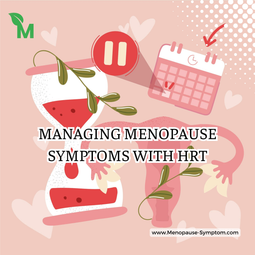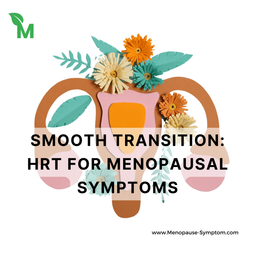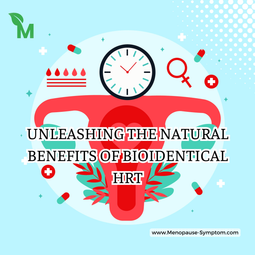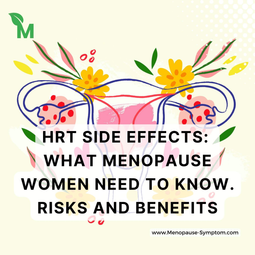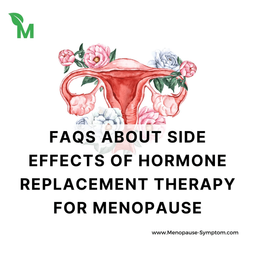Understanding the Side Effects of Hormone Replacement Therapy for Menopause
The Promise and Perils of Hormone Replacement Therapy
Hormone Replacement Therapy (HRT) has been a beacon of hope for many women navigating the choppy waters of menopause. It's touted as a solution to alleviate the often-debilitating symptoms that come with this natural life transition. But like any medical intervention, HRT isn't without its drawbacks. As we delve into the side effects of hormone replacement therapy for menopause, it's crucial to approach this topic with open eyes and a critical mind.
Common Side Effects: What to Expect
When considering HRT, it's important to be aware of the potential side effects that many women experience. These can range from mildly annoying to more concerning:
Breast Tenderness and Swelling
Many women report increased breast sensitivity
This side effect often diminishes over time
Regular breast examinations are crucial during HRT
Bloating and Weight Gain
Fluid retention is a common complaint
Weight gain, while often attributed to HRT, may be due to other factors
Dietary and lifestyle changes can help manage this side effect
Mood Swings and Depression
Hormonal fluctuations can affect mood
Some women experience increased irritability or depressive symptoms
It's essential to communicate these changes with your healthcare provider
Headaches and Nausea
Headaches may occur, especially in the early stages of treatment
Nausea is less common but can be distressing for some
Adjusting dosage or changing the form of HRT may help alleviate these symptoms
Long-Term Risks: Weighing the Evidence
While short-term side effects are important to consider, the long-term risks associated with HRT have been the subject of much debate and research.
Cardiovascular Concerns
Recent studies have shown that the relationship between HRT and cardiovascular health is complex. While earlier research suggested an increased risk of heart disease and stroke, newer evidence paints a more nuanced picture:
Women who start HRT close to menopause may have a lower risk of heart disease
The type of hormones used and the method of delivery can affect cardiovascular risk
Individual health factors play a significant role in determining overall risk
Cancer Risk: Separating Fact from Fiction
One of the most controversial aspects of HRT is its potential link to certain cancers:
Breast cancer risk may be slightly elevated with long-term use of combined HRT
The risk appears to be lower with estrogen-only HRT
Ovarian cancer risk may be marginally increased, but the absolute risk remains low
It's crucial to discuss your personal and family medical history with your doctor when considering HRT.
Bone Health: A Silver Lining
Amidst the concerns, it's important to note that HRT has been shown to have a positive effect on bone density.
HRT can help prevent osteoporosis
It may reduce the risk of fractures in postmenopausal women
This benefit should be weighed against other potential risks
Navigating HRT: A Personalized Approach
Given the complex nature of HRT's side effects, a one-size-fits-all approach is inadequate. Here's how to navigate this treatment option:
Tailoring Treatment to Your Needs
Work closely with your healthcare provider to find the right hormone combination
Consider starting with the lowest effective dose
Be open to adjusting your treatment plan as your body responds
Monitoring Your Health
Regular check-ups are essential when on HRT.
Schedule routine mammograms and breast exams
Keep track of any changes in your body or mood
Don't hesitate to report new symptoms to your doctor
Exploring Alternatives
For some women, the side effects or risks of HRT may outweigh the benefits.
Lifestyle changes can help manage some menopausal symptoms
Non-hormonal medications are available for specific symptoms
Complementary therapies may offer relief for some women
Making an Informed Decision
As we've explored the side effects of hormone replacement therapy for menopause, it's clear that this treatment option comes with both benefits and risks. The decision to start HRT should not be taken lightly, nor should it be dismissed out of hand due to fears or misconceptions.
Remember:
Every woman's experience with menopause and HRT is unique
The benefits of HRT may outweigh the risks for many women, especially those with severe menopausal symptoms
Regular communication with your healthcare provider is key to managing side effects and minimizing risks
In conclusion, while the side effects of hormone replacement therapy for menopause are real and should be carefully considered, they don't tell the whole story. For many women, HRT can provide significant relief from menopausal symptoms and improve quality of life. The key is to be informed, vigilant, and proactive in your healthcare decisions.
Whether you're considering HRT, currently undergoing treatment, or exploring alternatives, remember that you have options. Stay informed, listen to your body, and work with your healthcare team to find the best path forward through this transformative stage of life.
SUMMARY:
Potential Side Effects of Hormone Replacement Therapy (HRT)
Hormone replacement therapy (HRT) can be an effective treatment for menopausal symptoms. However, it's important to be aware of the potential side effects.
Common side effects of HRT include:
Breast tenderness: This is a common side effect of both estrogen and progesterone.
Bloating and fluid retention: This can be caused by estrogen.
Headaches and migraines: These can be caused by both estrogen and progesterone.
Mood swings and depression: These can be caused by both estrogen and progestin.
Vaginal bleeding: This can be caused by both estrogen and progesteroneprogesterone.
Increased risk of blood clots: This is a more serious side effect of HRT.
To reduce the risk of side effects, your doctor may recommend:
The lowest effective dose of HRT.
A specific type of HRT, such as a patch or gel.
Regular check-ups.
It's important to talk to your doctor about the potential risks and benefits of HRT before starting treatment.
Please note: This information is not a substitute for professional medical advice. Always consult with a healthcare provider for any health concerns.
Source: Team MPS compiled, analyzed,progesterone and wrote. Please dont reup without source of us. Many thanks.

